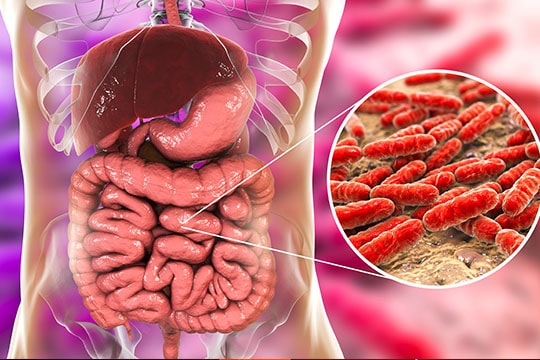Although you’ve probably heard the expression “trust your gut”, did you know that you must also take care of it? Your overall health is directly affected by a healthy gut. What is gut health? Why is it important and how do they relate to your overall health? Let’s find the answers!
What is Gut Health?
Let’s first define gut. Your digestive tract includes your stomach, small intestinale, large intestine and colon. You’re more likely to hear medical professionals use the term “Gut Microbiome” when discussing gut health. The trillions of microorganisms living in your digestive tract . You actually have more microorganisms than human cells in your gut! Your gut microbiome is like a population in a diverse city. Except that instead of people you have bacteria, yeasts and viruses.
The microorganisms in your gut flora play an important and vital role in your overall health. Your gut microorganisms can be classified into two types: beneficial (good) or harmful (bad). Your overall health and immune health are determined by the balance of good and poor microorganisms in your gut.
A Healthy Gut is Vital
Why is it important to care about your gut health? This may seem daunting but we need our trillions microbes balanced and present if we are to optimize our overall health for three reasons.
- Your body would not survive without the help of your gut flora.
- Most of your immune system cells reside in your digestive tract. Your gut is home to about 80% your immune system. Gut health means fewer sick days, fewer allergies and autoimmune conditions.
- It doesn’t matter what diet you follow if your intestinal lining isn’t healthy enough to absorb your food. This is because you won’t be able receive the nutritional benefits from what you eat.
How Your Gut Effects Your Health
Let’s take a look at how gut health impacts specific body systems.
Researchers discovered that certain types of gut bacteria could be responsible for the link between cholesterol levels and heart disease. When you eat foods like red meat or eggs, these bacteria produce a chemical that your liver processes into TMAO (trimethylamine-N-oxide). Research has shown that TMAO may reduce the amount of cholesterol in your blood vessels. Chronic kidney disease may be caused by too much TMAO. Chronic kidney disease patients don’t eliminate as much TMAO as they should. This can lead to a surplus which can cause heart disease.
Gut bacteria and your mind
Many scientists believe that the gut acts as a second brain, sending messages to all parts of your body including your brain. Studies have shown that gut bacteria balance can influence emotions and how your brain processes information.
Obesity and gut bacteria
Studies have shown that people with obesity are more diverse in their gut flora than those of normal weight. The study also showed that people who have a smaller supply of gut flora are more likely to be obese. A 2018 study found a connection between obesity and gut health. They discovered that certain amino acids in the blood could be linked to obesity and the composition and function of the gut biome. The pituitary gland produces hormones that can affect your appetite, so gut health could also be related to it.
These are just a few examples that show how gut health can be linked to other health conditions and body functions. If you’re still not convinced of how important your gut health is, here are a few other conditions that may be linked to Irritable bowel syndrome (IBS)
- Acid Reflux
- Liver disease
- Cancer
- Autism
- Chronic fatigue
- Depression
- Anxiety
- You are convinced and now you want to know how to tell if your gut is healthy.
Checklist for Gut Health
There are many signs that your gut is unhealthy. Bloating and other symptoms that can be attributed to a dysfunction or overgrowth of your gut flora, such as nausea, constipation (heartburn), diarrhea, acid reflux, stomach cramps, heartburn, heartburn, stomach cramps, heartburn, heartburn, stomach pains, and acid reflux, are all signs of a healthy gut. An unhealthy gut can cause more than just GI symptoms.
An unhealthy gut can lead to a variety of symptoms such as fatigue, depression and anxiety, joint pain, insomnia, memory loss, headaches, migraines, stress, and other health issues.
Many factors can affect gut health and lead to the above symptoms.
- Diet
- Stress level
- Sleep efficiency
- Exercise
- Medikamente
New technology allows you to use DNA testing to gain a better understanding about your gut. This DNA testing can detect levels of.
- Healthy bacteria
- Pathogenic bacteria
- Opportunistic bacteria
- Parasites
- Yeast
- Viral infections
How to Restore Gut Health
Good news! There are many ways to improve your natural gut health. Making the right lifestyle and dietary adjustments can positively affect the diversity and amount of microbes within your gut.
Use Probiotics
Probiotics are beneficial bacteria that is similar to good bacteria in your gut. Good bacteria takes up less space than harmful bacteria. Consuming probiotic supplements and fermented foods can help you get more probiotics.
Prebiotics
Prebiotics are non-digestible carbohydrates.
Prebiotics are a favorite food of probiotics. This can increase the amount of probiotics within your biome. Prebiotics could make probiotics more sensitive to temperature changes and pH, according to a 2017 study. Foods like garlic, asparagus, bananas and other prebiotics are abundant.
Do Not Use Unnecessary Antibiotics
It is well-known that antibiotics can seriously harm the microbiome. While it might be necessary to use antibiotics in order to fight bacterial infections, doctors in America tend to prescribe them too often. Before you prescribe antibiotics, talk to your doctor about other options.

